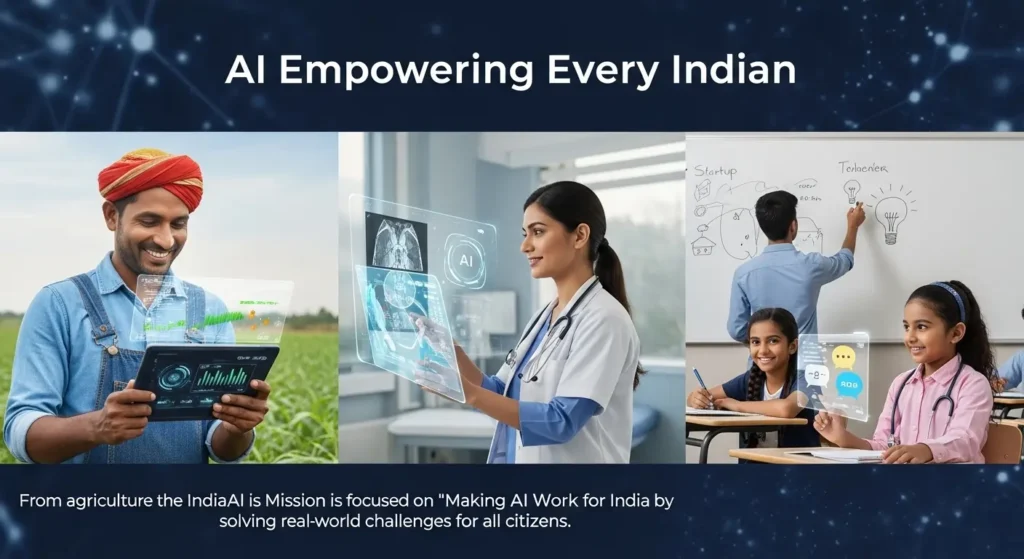How India’s ambitious ₹10,300 crore IndiaAI Mission is transforming the nation with 38,000 GPUs, fostering innovation, and aiming to add $1.7 trillion to its economy by 2035.
NEW DELHI – India is accelerating its mission to become a global artificial intelligence powerhouse, backed by a massive ₹10,300 crore ($1.24 billion) investment in the IndiaAI Mission.
Spearheaded by the Ministry of Electronics and Information Technology (MeitY), this ambitious five-year plan is already democratizing AI by deploying 38,000 graphics processing units (GPUs) nationwide, empowering startups, researchers, and enterprises to innovate at an unprecedented scale.
This strategic push aims to cement India’s position in the global tech landscape and harness AI for inclusive societal development.
The government’s vision, “Making AI in India and Making AI Work for India,” is rapidly taking shape.
The initiative, approved in March 2024, is structured around seven key pillars designed to build a comprehensive ecosystem encompassing computing infrastructure, data, application development, and skilled talent.
The economic implications are staggering, with projections suggesting AI could add up to $1.7 trillion to India’s economy by 2035.
Fueling Innovation with Accessible Compute Power
A cornerstone of the IndiaAI Mission is the provision of affordable high-performance computing.
By making 38,000 GPUs available at a subsidized rate of just ₹65 per hour, the government has significantly lowered the barrier to entry for innovators across the country.
This move is designed to reduce dependence on foreign systems and foster a self-reliant AI ecosystem.
“We have adopted innovative means…to build viable projects and products that will truly make a difference for us,” said MeitY Secretary S. Krishnan, highlighting the frugal yet ambitious approach.
This powerful infrastructure is already supporting 12 Indian companies in developing indigenous foundational models.
Building a Future-Ready Workforce
Recognizing that talent is critical, the mission places a strong emphasis on skilling.
The AI talent base in India is expected to more than double from approximately 6.5 lakh professionals to over 12.5 lakh by 2027.
Initiatives under the ‘FutureSkills’ pillar are supporting Ph.D. fellows, postgraduates, and undergraduates to meet the surging demand for AI expertise in data science and machine learning.
Despite this growth, studies indicate a potential talent gap, highlighting the urgent need for continued upskilling efforts.
The Stanford AI Index has recognized India’s growing prowess, ranking it among the top four countries globally for its AI skills and policies.
The country has also seen the highest year-over-year growth in AI hiring globally.
AI for Societal Transformation
Beyond economic growth, India’s AI revolution is focused on solving real-world challenges in critical sectors.

Key Sectors Benefiting from India’s AI Push:
- Healthcare: AI-powered diagnostic tools are enhancing the accuracy of medical imaging analysis, while telemedicine platforms are extending healthcare access to remote areas.
- Agriculture: Farmers are leveraging AI-driven insights for crop monitoring, pest detection, and weather forecasting, leading to improved yields and income. The Kisan e-Mitra chatbot is one such tool providing multilingual support to farmers.
- Language and Inclusion: To bridge the digital divide, the government launched BharatGen AI on June 2, 2025. This homegrown, multimodal large language model supports 22 Indian languages, ensuring technology is accessible to all citizens. The Bhashini platform, which supports 20 languages, has also surpassed one million downloads.
Empowering the Informal Economy
In a pioneering move, NITI Aayog released a report in October 2025 titled “AI for Inclusive Societal Development,” which outlines a roadmap to empower India’s 490 million informal workers.
The proposed Digital ShramSetu Mission aims to use AI, blockchain, and other technologies to provide workers with better access to skilling, financial services, and social protection.
This initiative is crucial for ensuring that the benefits of the digital revolution reach the most vulnerable segments of society.
A Thriving Enterprise and Startup Ecosystem
Indian enterprises are rapidly embracing AI. According to the NASSCOM AI Adoption Index, 87% of companies are actively using AI solutions.
The country’s AI market is projected to grow at a CAGR of 25-35% by 2027.
The startup scene is equally vibrant, with nearly 89% of new startups launched in the past year incorporating AI into their core offerings.
Looking ahead, India is set to host the AI Impact Summit in New Delhi in February 2026.
The summit will showcase the nation’s capabilities and foster global collaboration, further solidifying its role as a leader in the AI-driven future.